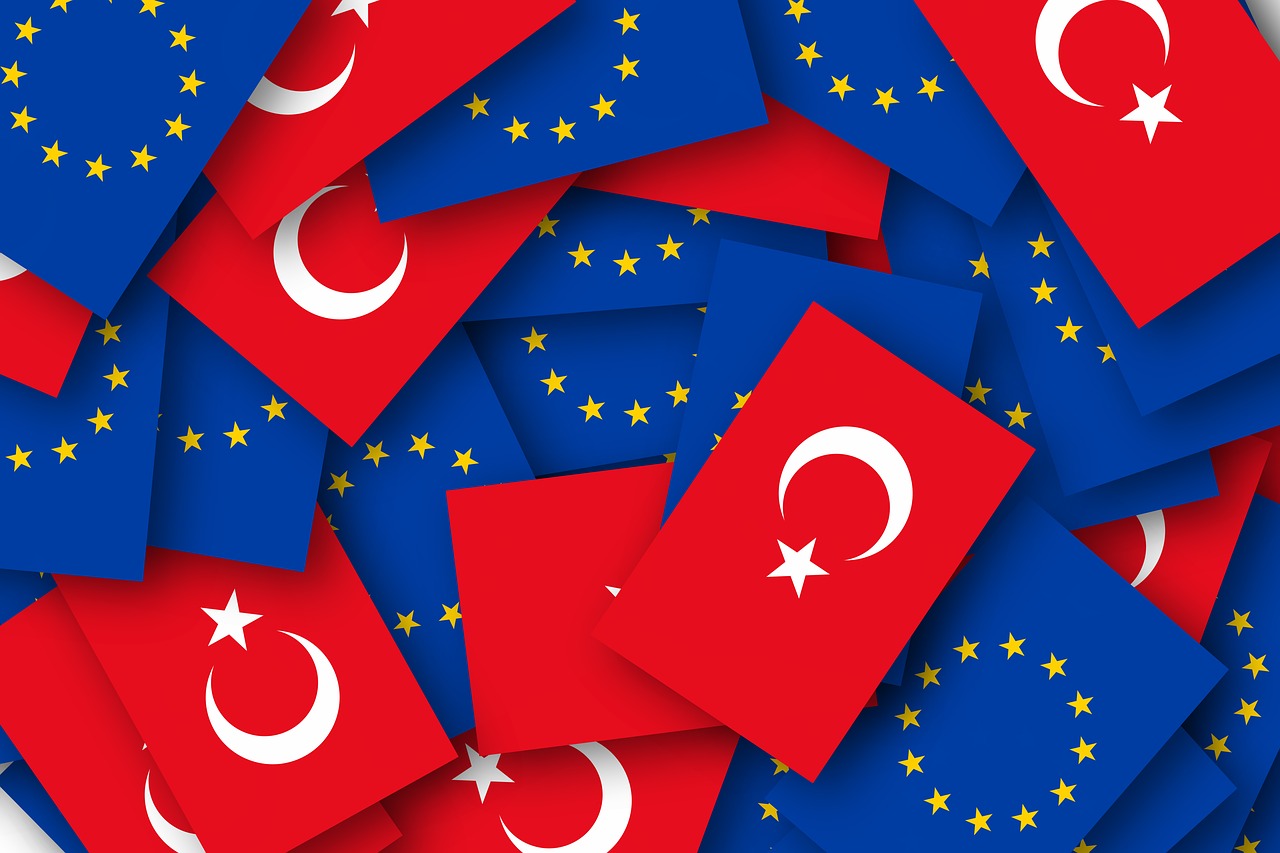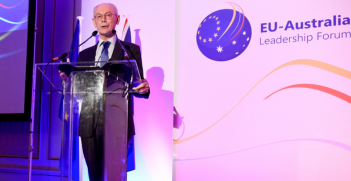Transactionalism in International Relations: Turkey’s Relations With The European Union

Despite accession to the EU being one of Turkey’s long-term goals, its strategic gaze has recently shifted from Europe to the Middle East.
In Turkey, accession to the EU has been a state policy at least since 1963 when the association agreement was signed between Turkey and the European Economic Community. Turkey first applied for EU accession in 1987, although very little progress took place until 1999 when Turkey’s candidacy was recognised by the EU for the first time.
The Justice and Development Party (AKP) government made considerable progress toward EU membership between 2002 and 2005. Upon coming to power in 2002, the AKP initiated a reform spree in order to meet the Copenhagen criteria. The reforms followed the recommendations of the EU and were comprehensive, capturing many areas such as minority rights, freedom of speech, civilianisation of the military and abolition of death penalty. The result was a historic victory for the AKP government and Turkish democracy: in December 2004, the European Commission’s Progress Report acknowledged the effectiveness of the reforms, stated that Turkey had met Copenhagen criteria and was eligible for accession negotiations. Acknowledging the findings of the EC report, the EU stated that the formal accession negotiations with Turkey could start on October 2005.
In addition to selective Europeanisation, Turkey-EU relations were also changing due to Turkey’s increasing self-confidence coupled with its economic growth, regional ambitions and the AKP government’s Islamist leanings.
This pro-Western, complementary outlook began to change after 2009 thanks to several important developments in the region, AKP’s consolidation of power at home and Davutoglu’s appointment as foreign minister. The 2010 Constitutional
Amendments that undermined both the military and the judiciary components of the Kemalist establishment helped the way for the AKP to consolidate its power at home and get a more powerful reign over TFP. Moreover, at the bureaucratic level, the appointment of Ahmet Davutoglu as the minister of foreign affairs in 2009 provided more prominence and power to his ideas. It is important to note that, Davutoglu’s predecessor Ali Babacan was known for his technocratic approach and pro-Western attitude.
Davutoglu was not fond of Turkey being on the periphery of the West and instead argued that it should be a central country by carving out its own foreign policy course based on its geopolitical, historical and cultural advantages derived from its Muslim Ottoman past. Davutoglu’s civilisational geopolitics argued that the Muslim lands of the former Ottoman Empire continue to reveal an embedded Ottoman spirit in their social life which should be exploited for Turkey’s strategic advantage. These people are the ‘tarihdas’, that is, sharing the same history with Turkey, and these places constitute historically legitimate sphere of influence for Turkey. By sphere of influence, Davutoglu meant a new configuration in the Middle East where Turkey should become a regional power by developing better ties with its Muslim neighbours, sometimes at the
expense of relations with its traditional Western allies.
This approach was a clear break with Turkey’s traditional foreign policy not only because it relinquished the absolute priority of Westernisation and of relations with the West, but more importantly, it put a civilisational perspective at the heart of Turkey’s relations with the EU that pitted the Islamic civilisation against the Western civilisation. Davutoglu’s civilisational perspective envisioned a rivalry between Turkey and the West, and painted the EU as a hostile entity geared against Turkey’s interests. For Davutoglu, the time had arrived for Turkey to stop playing the pawn in the West’s Great Game, and start mastering its own Great Game with leadership of the Muslim world.
Areas and motives for transactionalist interaction with the EU
Transactionalism is a foreign policy approach that favours bilateral to multilateral relations, focuses on short-term wins rather than longer-term strategic foresight, adheres to a zero-sum worldview where all gains are relative and reciprocity is absent, rejects value-based policymaking, and does not follow a grand strategy. Turkey’s transactionalist turn can be best recognised in its relations with the EU, not only because of the strictly transactionalist character of the new bilateral policy agendas, but also because the transactionalist era is sharply different from the previous periods.
In what areas and for what reasons have the shift taken place? The ‘deal’ that signalled the transactionalist turn in Turkey-EU relations was the refugee deal signed in March 2016 between the EU and Turkey. The deal involved favourable transactions for both sides. Turkey agreed to prevent the refugee flow from Syria to the EU, whereas the EU accepted to pay 3 billion Euros in two years to Turkey for taking care of the Syrian refugees. The EU also agreed to send security and tracking technology worth 30 million Euros to protect the Turkish borders from the refugee flow, and additional 18 million Euros were paid to a Dutch company to produce six naval boats for the Turkish Coast Guard Command. As part of the deal, Turkey also extracted promises to accelerate visa liberalisation with Europe and open a chapter in the EU accession negotiations.
The deal signalled the transactionalist turn in Turkey-EU relations in several ways. To begin with, it involved a short-term fix for a major humanitarian crisis based on a monetary exchange. Instead of recourse to international and/or EU norms and principles guiding the management of refugees, both sides agreed to design an ad-hoc temporary mechanism to fix the problem. Also, instead of waiting for Turkey’s full compliance with the EU accession requirements, the EU promised visa liberalisation and progress in accession process in exchange for Turkey’s agreement to stem the refugee flow. It is important to note that up to that point, visa liberalisation for other countries was only offered in the context of accession. Therefore, although the deal involved progress in accession process, it was not tied to principles and norms as in the Europeanisation period, but instead represented an ad-hoc transactionalist agreement between the two sides satisfying the needs/interests of both sides.
For Turkey, the transactional relationship helps to score points in domestic politics and pursue its short-term strategic interests in the neighbourhood. Pursuing the EU accession process provides an opportunity for the Erdogan regime to portray itself as a democratic actor and silence its critics both at home and abroad, despite its worsening human rights record. Also, the 3 million refugees that Turkey has already accepted from Syria creates a strain on the already deteriorating economic situation in Turkey and has led to serious criticism of the Erdogan regime at home. While not a perfect solution, the 3 billion Euros that the government receives every two years can alleviate some of the pressure on economy. Also, visa liberalisation has been a long-time desire of Turkish citizens, and its realisation would allow the AKP to score some popularity points at home. Moreover, its strategic importance in curtailing the refugee flow to Europe gives the Erdogan regime a significant advantage in opposing the EU’s demands for democratic reforms in Turkey while continuing to receive the boons of strategic partnership.
Moreover, in the new transactionalist era, the EU in general, and leading EU-member countries in particular, have been pursuing an appeasement policy toward the Erdogan regime’s worsening human rights record. Already in late 2015, it was revealed that the European Commission postponed its Turkey progress report until after the fateful parliamentary elections in November in order not to hurt the ruling AKP’s electoral chances at home, and hence complicate the negotiations on how Turkey could help stem the refugee flow into Europe. In April 2018, the European Union Commission published a report, the harshest to date, on Turkey which criticised human right violations, the continuous state of emergency, the politicisation of judiciary and lack of respect to the rule of law. European journalists, experts, and analysts have been calling the EU to exert more pressure on Erdogan.
However, in general, the EU failed to pursue a principled human rights policy toward Turkey due to the latter’s strategic importance in stemming the refugee flow and keeping Europe safe from the impact of the ongoing debacle in the Middle East. Moreover, leading EU countries, Germany and France, have not shown any discomfort in following what some have criticised as an ‘appeasement policy’ toward Turkey especially when these two countries went on with the deal to sell weapons to Turkey, which the latter quite consistently uses to crack down its Kurdish population. Self-centred opportunism and lack of principles on the part of the prominent members of the EU are clearly manifested in the assertion of Michael Roth, Germany’s minister for the European Union, that the EU should restart the accession talks with Turkey:
It is in the hands of those responsible in Turkey to decide whether they want to be a member of this European community of values. I would suggest we do not slam the door shut. That would be a wrong signal toward those in Turkey who still long for European values.
When German Federal Minister for Economic Affairs and Energy Peter Altmaier and Turkish Energy Minister and Erdogan’s son-in-law Berat Albayrak met, Altmaier argued that ‘Minister Albayrak and I agreed to deepen our cooperation’ on environmental policy, climate protection and renewable energy. Although, the tensions in recent years have damaged Turkey–German relations, the current stance of Germany is aimed at a normalisation process with the Turkish government as their economic trade reached 37.6 billion Euros in 2017.
As the above discussion shows, in the transactionalist era, Turkey ended strategic long-term cooperation with the EU and started to approach the bilateral relations with a strictly zero-sum logic. While the previous De-Europanising and civilisational period was characterised by strategic and moralistic struggle with the EU, the transactionalist logic is devoidof such principled assumptions and is dominated by cost–benefit calculations instead. Moreover, the shift toward transactionalism has also sidelined the role of EU institutions.
As the EU and the US lose their normative power status, and as populism emerges as the dominant style in many democratic and non-democratic countries, transactionalist foreign policy is becoming more prevalent. In this context, countries such as the US, Russia, Turkey and even smaller ones such as Azerbaijan are resorting to transactionalism in their relations with the EU.
This article is an extract from Galib Bashirov and Ihsan Yilmaz’s article in the Australian Journal of International Affairs titled ‘The Rise of Transactionalism in International Relations: Evidence From Turkey’s Relations With The European Union‘. It is republished with permission.





